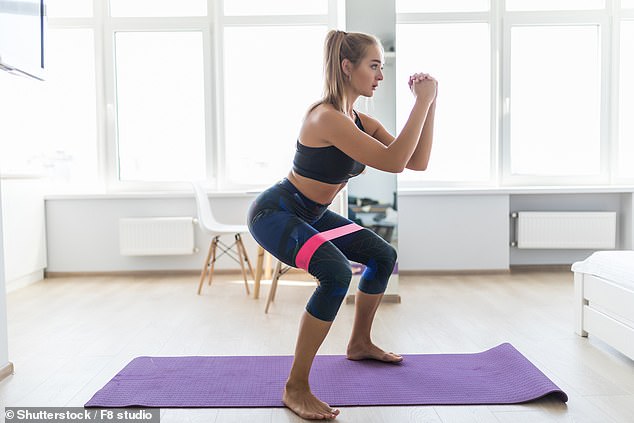Britons whose fitness levels slipped during the pandemic are now suffering from ‘FOWO’, fear of working out, according to one gym chain.
Fitness First says that Covid ruined many people’s exercise regimes, with nearly half (45 per cent) of those polled saying they are still stuck in ‘fitness doldrums’.
And while one-in-five bought exercise equipment for use at home, only five per cent said they were still using it a year on.
Nearly half (44 per cent) said lack of motivation was behind their reluctance to get back to the gym, while 35 per cent cited a lack of confidence.

Fitness First says that Covid ruined many people’s exercise regimes, with nearly half (45 per cent) of those polled saying they are still stuck in ‘fitness doldrums’ (stock)
Women suffered the most, with the poll finding more than a third (36 per cent) of women said they felt less healthy as a result of the pandemic, compared with just 26 per cent of men.
Their poll of 2,000 people complements research by Public Health England that found that more than four in 10 adults in England said they have put on weight since the first lockdown.
Average weight gain was half a stone (4.1kg) with one in five saying they put on a stone or more.
‘With so much to deal with, fitness was eventually furloughed and general health has suffered as a result’, said Tim Andrews, head of product at Fitness First.
‘Now society is opening up again, people want to get back to a new routine, but with their morale and motivation shattered, they are struggling to find a roadmap back to fitness.’
According to their poll, millennials (ages 25 – 34) were said to be struggling the most to get back into a regular exercise routine, with nearly two-thirds (59 per cent) struggling.
HOW MUCH EXERCISE YOU NEED
To stay healthy, adults aged 19 to 64 should try to be active daily and should do:
at least 150 minutes of moderate aerobic activity such as cycling or brisk walking every week andstrength exercises on 2 or more days a week that work all the major muscles (legs, hips, back, abdomen, chest, shoulders and arms)
Or:
75 minutes of vigorous aerobic activity such as running or a game of singles tennis every week andstrength exercises on 2 or more days a week that work all the major muscles (legs, hips, back, abdomen, chest, shoulders and arms)
Or:
a mix of moderate and vigorous aerobic activity every week – for example, 2 x 30-minute runs plus 30 minutes of brisk walking equates to 150 minutes of moderate aerobic activity andstrength exercises on 2 or more days a week that work all the major muscles (legs, hips, back, abdomen, chest, shoulders and arms)
A good rule is that 1 minute of vigorous activity provides the same health benefits as 2 minutes of moderate activity.
One way to do your recommended 150 minutes of weekly physical activity is to do 30 minutes on 5 days every week.
All adults should also break up long periods of sitting with light activity.
Source: NHS
Advertisement
Source link : https://www.dailymail.co.uk/health/article-9843171/Britons-suffering-FOWO-Covid-gym-says.html











